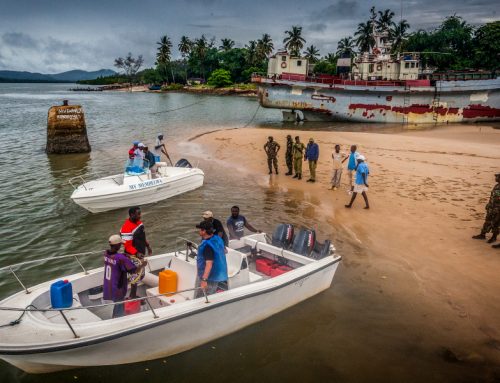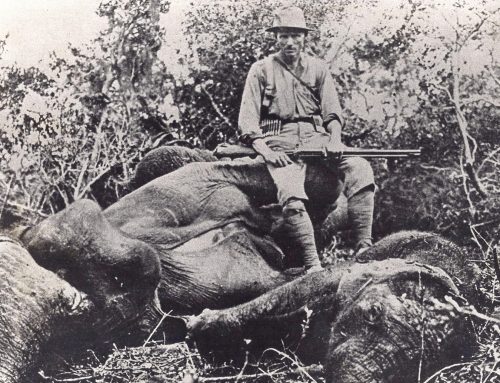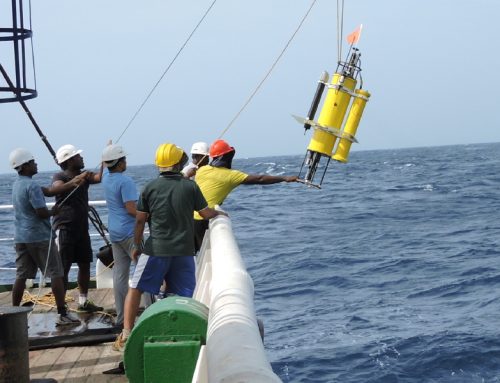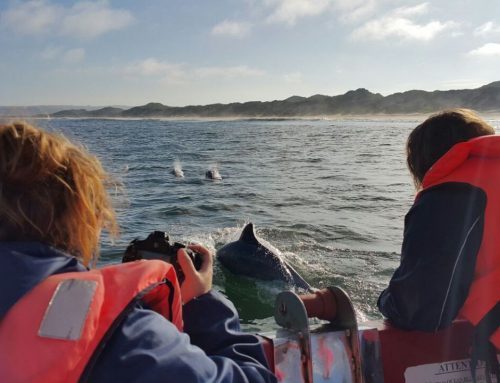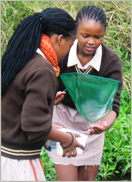 ‘At first the learners don’t regard rivers as important; they just see them as running water unrelated to their lives. Many also have a fear of rivers because they’ve been told frightening stories about river snakes.’
‘At first the learners don’t regard rivers as important; they just see them as running water unrelated to their lives. Many also have a fear of rivers because they’ve been told frightening stories about river snakes.’
Wendy Ngcobo, an environmental education coordinator for the Duzi uMngeni Conservation Trust (DUCT), discusses the initial attitude of the learners from 16 schools with whom she has been working in the vicinity of the uMngeni and the uMsunduze Rivers – two key water sources in KwaZulu-Natal, spanning 260kms in length.
Through a series of activities and outings Ngcobo is teaching learners between the ages of 9 and 17 about the value of rivers and wetlands in their lives, why waste has to be carefully managed and why alien invasive plants have to be controlled and cleared.
In one of the activities learners of all ages are taught how to use aquatic biomonitoring tools, such as miniSASS (a low cost water quality monitoring tool). This empowers them to identify pollution sources in real time, and assess at a broad level the degree of pollution. When pollution and E.coli levels are too high they contact the relevant water management authority, and ideally follow up to make sure they have taken action.
In another activity the stories about river snakes are discussed and shared. The learners start to understand the power of myths and that the stories served to keep them away from the water because of the risk of drowning.
‘The change in the learners’ response to rivers when they start to understand that rivers are our friends, that we cannot survive without them and that healthy rivers mean healthy communities, is so gratifying. It’s a deep feeling that you have done something right when you see them proactively participating in the management of the rivers,’ says Ngcobo.
The 16 schools are part of the Adopt a River programme, managed by DUCT in partnership with the Wildlife and Environment Society of South Africa (WESSA) and the Water Research Commission (WRC).
The WWF Nedbank Green Trust is now helping to finance the Adopt a River programme in order to grow the number of participating schools and communities.
‘Implementation of the Adopt a River concept in this area evolved from a GIS analysis of the proximity of schools to the uMngeni and uMsunduze or Duzi Rivers. It showed that approximately 1000 schools are within a five-kilometre radius of these rivers,” explains Doug Burden, General Manager of DUCT.
This provided an ideal opportunity for these schools and their communities to Adopt a River, become biodiversity stewards and take on the challenge of improving, maintaining and monitoring the section of the river that runs through their area.
‘We work with and through the local community structures and traditional leaders,’ continues Burden. ‘Most have been very supportive of what we are doing and have given their blessing for us to work with the communities and schools.’
DUCT started eight years ago, initially as a canoeists’ outreach initiative. It has since grown into an extensive uMngeni-uMsunduze River System conservation initiative, which includes the participation of municipalities, water user associations, catchment management agencies and the industrial and agricultural sector in and around Pietermaritzburg and Durban.
Reconnecting science, people and the management of natural resources is the major challenge of our time. The DUCT project is helping to achieve this through environmental education and by championing active citizenry where communities are encouraged to take ownership and responsibility for their rivers.
‘We have a whole range of initiatives around the river system, including encouraging communities to help collect solid waste that has been dumped in the river, and to stop dumping it themselves,’ says Burden.
Next to sewerage, the dumping of solid waste in the river is a frightening problem. You can imagine the extent of it if you think of tens of thousands of people daily dumping plastic bags full of waste into the river.
‘There are major water issues around this river system, including severe pollution (with associated health implications) from industry, agriculture and urban and informal settlements,’ explains Brent Corcoran, Manager of the WWF Maputaland-Pondoland region, within which the uMngeni system and Adopt a River is a priority project.
‘There is also enormous demand on its water supply as it feeds one of South Africa’s largest economic hubs,’ says Corcoran. ‘As part of our work we are engaging with the Department of Water Affairs, Ethekwini Metro, and uMngeni Water, not only around the current water use requirements associated with this river system, but also the requirements for the next 10-20 years, which are already stretched.’
Water conservation, water security and the water footprint is a priority focus for Nedbank and the WWF Nedbank Green Trust. Over the past 23 years the WWF Nedbank Green Trust has funded approximately 190 major conservation projects to the value of R130-million.
‘DUCT’s Adopt a River is the latest of several water projects we have funded, aimed at the conservation and good management of catchments and river systems in South Africa,’ explains Maseda Ratshikuni, Head of Cause Marketing at Nedbank. ‘Rivers belong to all the people of South Africa and we encourage participation in their conservation at all levels to help strengthen ecosystems management in our country.’
‘We are trying to get the message across that investing in the maintenance or restoration of ecological infrastructure generates significant water supply and purification benefits for local and downstream user,’ says Corcoran.
‘Our health, our economy and our future depends on it,’ adds Burden. ‘Working with government, municipalities and communities takes time but there is definitely a growing number of movers and shakers who are helping us drive the bigger picture of ecosystems conservation as an essential aspect of service delivery to society.’
For more information:
www.duct.org.za
